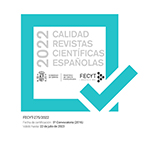Between Epic and Parody: National Liberation Processes in Gonzalo Torrente Ballester’s La saga/fuga de J. B.
Abstract
Gonzalo Torrente Ballester (1910-1999) is, without any doubt, one of the most important spanish novelists of the second half of the past century. The achievement of this canonical position is in direct relation to the good reception of his novel La saga/fuga de J. B. (1972), which was acclaimed by the critic and public. Also, it is at this moment when the author decided to get close to the Galician culture and to participate in its intellectual and political debates. With this contribution we aim at enlightening the strategies that Torrente has developed in order to achieve key positions in two systems crossed by a national conflict: the Galician and the Spanish ones. For this purpose, we will analyse the role that history and historians plays in La saga/fuga de J. B. while paying special attention to the different national liberation processes represented in the novel. Our objective is to reread the text not only as a ludic artefact, but also as politically committed literature.
Downloads
Article download
License
In order to support the global exchange of knowledge, the journal Madrygal. Revista de Estudios Gallegos is allowing unrestricted access to its content as from its publication in this electronic edition, and as such it is an open-access journal. The originals published in this journal are the property of the Complutense University of Madrid and any reproduction thereof in full or in part must cite the source. All content is distributed under a Creative Commons Attribution 4.0 use and distribution licence (CC BY 4.0). This circumstance must be expressly stated in these terms where necessary. You can view the summary and the complete legal text of the licence.








